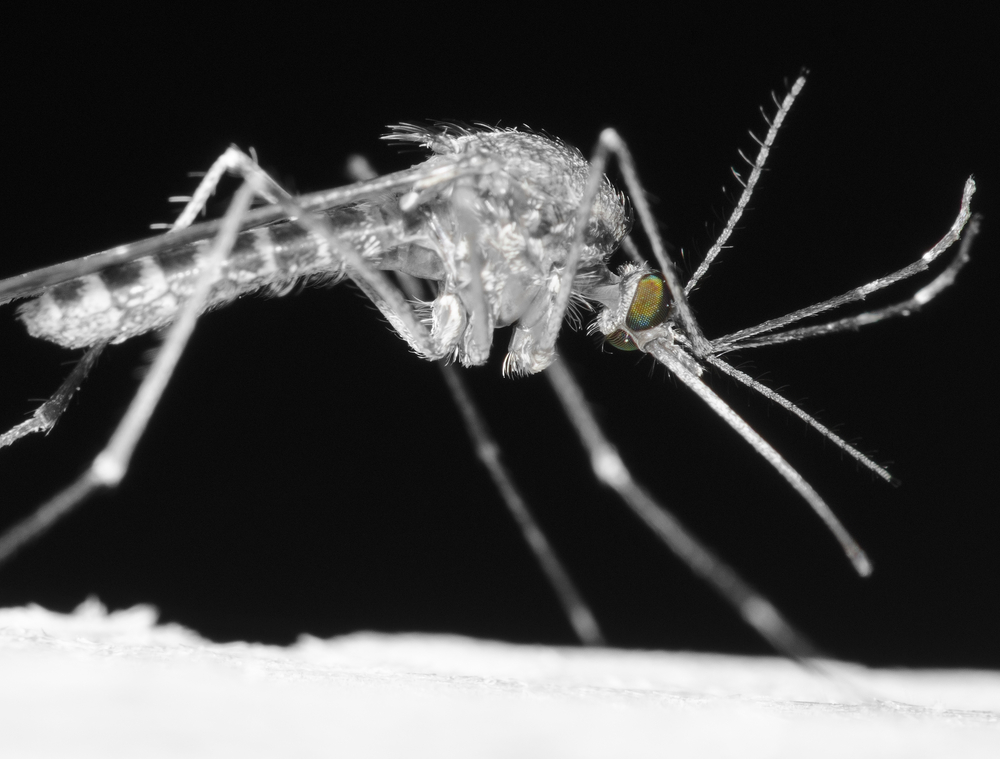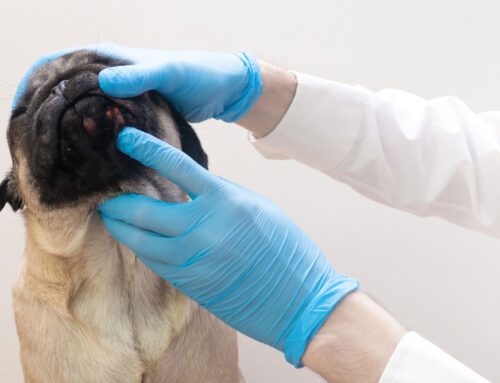If you thought you already had plenty of reasons to hate mosquitoes, think again. Mosquitoes are a year-round threat that can transmit deadly heartworms to your pets. Heartworms can permanently damage their host’s heart and lungs, and although treatment is possible for infected dogs, options are limited for cats. Thankfully, heartworm infection and disease are completely preventable with easy-to-administer monthly products, making prevention a much better option than costly treatment. Palisades Veterinary Hospital recommends year-round preventives for all pets.
Heartworm life cycle and pets as disease reservoirs
How do pets get heartworms in the first place? Heartworms, which have been found in all 50 U.S. states, prefer to live in canine hosts—dogs, wolves, coyotes, and foxes—but can infect other species as well, notably cats and ferrets. Adult worms live in the heart, lungs, and surrounding blood vessels of the host, where they mate and introduce microscopic, immature worms (i.e., microfilariae) into the bloodstream. Wild animals or pets with circulating microfilariae serve as a community reservoir for infection—mosquitoes bite these animals, pick up the microfilariae, and transmit them to other hosts once they’ve matured in the mosquito for a few weeks. Inside the new host, the microfilariae take several months to migrate to the heart and lungs, where they mature into adults and start the cycle over again.
In dogs, the worms reproduce quickly. The adults can live five to seven years, so the longer dogs are infected, the more worms they will harbor—hundreds in some cases. The more worms in a pet, the more complicated and dangerous the treatment, so starting treatment as soon as infection is detected is imperative. Cats are atypical hosts, so most worms in cats die before reaching adulthood, and do not reproduce. This means infected cats may have only one or two worms, but they can still cause serious illness or death.
Heartworm disease signs in dogs and cats
Heartworms cause serious, progressive damage to the heart, lungs, and blood vessels. The longer infection is present, the more likely the damage may be irreversible, or lead to death. Typically, no signs are obvious in early infection stages, but as infection progresses, dogs may show:
- Coughing
- Difficult breathing
- Exercise intolerance
- Heart failure
- Fluid in the abdomen
- Sudden death from caval syndrome (i.e., physical heart blockage with worms)
Cats have fewer worms, but their body responds with significant inflammation that can manifest as respiratory disease or mimic other, generalized illness. Unfortunately, the first heartworm disease sign in some cats may be sudden death caused by cardiac complications. Other signs in cats may include:
- Coughing that may mimic feline asthma
- Panting or labored breathing
- Vomiting, poor appetite, or weight loss
- Seizures
Heartworm prevention and testing do’s and don’ts
Heartworm treatment for dogs takes months, is painful and costly, and requires cage rest for the duration. For cats, no approved treatment exists, so treatment is aimed at supportive care, careful monitoring of existing worms, and prevention of new infections. Because heartworm treatments are so limited, prevention is the far better option to keep pets safe. Following are do’s and don’ts regarding heartworm prevention and testing.
DO: Keep all pets on heartworm prevention year-round, including indoor cats
Preventive products come in oral and topical formulations, and most include additional ingredients to protect against other types of parasites, like intestinal worms. Preventives work retroactively, killing immature worms before they reach an infective stage, but they must be given each month to be effective. Indoor pets need protection, too, because mosquitoes can easily get indoors. One in four infected cats lives indoors, so protect them with a monthly product, as well. Your Palisades Veterinary Hospital veterinarian can recommend the right product for your pet’s needs.
DO: Follow your veterinarian’s recommendations for heartworm blood testing
Heartworm testing schedules can be complicated, because deciding when to test depends on many factors, including timing of possible exposure, how long a pet has been on preventives, and the time of their last negative or positive test result. Generally speaking, most adult pets on their recommended prevention medication should have a blood test for heartworm once per year. If your pet’s preventive has lapsed for more than two months, you recently adopted a new pet, or you have a puppy or kitten or a pet who is heartworm-positive, follow your veterinarian’s recommendations for heartworm testing.
DON’T: Administer preventives seasonally
You may feel that mosquitoes are less active during the cooler months, but they are still present, and capable of biting year-round. Rather than guessing when your pet may be exposed to mosquitoes, prevention works best given continuously, year-round. Lapses in prevention can leave your pet vulnerable to infection.
DON’T: Mistake your flea or tick product for heartworm prevention

Pets are vulnerable to many parasites, but prevention products thankfully abound. While some products, notably those marketed for cats, provide “all-in-one” protection against fleas, ticks, heartworms, and intestinal parasites, often your pet will need two separate products to cover the bases. Most dogs use one product for fleas and ticks, and another for heartworms and intestinal parasites. Check with your veterinarian, to ensure your pet is protected.
Heartworms can cause serious or life-threatening disease, but you can easily keep your pet safe from this threat with monthly prevention medication. If your pet is due for their annual heartworm test, you’d like to start them on a heartworm preventive, or you have questions regarding heartworm disease, contact us to schedule a visit with your Palisades Veterinary Hospital team.








Leave A Comment